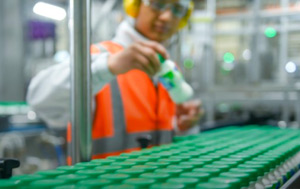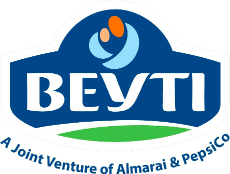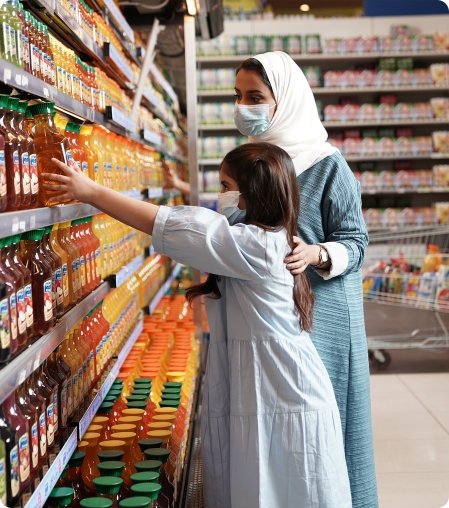Our sustainability performance
| 2018 | 2019 | 2020 | 2021 |
| Number of incidents of non-compliance with environmental laws and regulations | 1 | 1 | 0 | 0 |
Our sustainability performance
| 2018 | 2019 | 2020 | 2021 |
| Number of incidents of non-compliance concerning product information and labeling | 1 | 25 | 74 | 0 |
| Number of incidents of non-compliance with regulations and/or voluntary codes concerning marketing communications | 0 | 0 | 0 | 0 |
| Percentage of significant product categories covered by and assessed for compliance with product information and labeling procedures (%) | 100% | 100% | 100% | 100% |
Number of employee lost time injuries |
4 |
7 |
4 |
0 |
Contractor lost-time injuries |
0 |
0 |
0 |
0 |
Employee lost-time injury rate (per 1 Million man-hours) |
2 |
3 |
2 |
3.22 |
Contractor lost-time injury rate (per 1 Million man-hours) |
0 |
0 |
0 |
0 |
Hours of employee health and safety training |
9,603 |
11,058 |
11,259 |
13,739 |
Hours of contractor health and safety training |
5,396 |
4,215 |
725 |
3,377 |
Average hours of health and safety training per employee |
3 |
3 |
4 |
5 |
Average hours of health and safety training per contractor |
11 |
5 |
1 |
2.7 |
Employee absenteeism rate (%) |
1.70% |
1.90% |
1.80% |
1.75% |
| Number of employees | 3,181 | 3,265 | 2,800 | 2,957 |
| Male employees | 3,138 | 3,224 | 2,760 | 2,842 |
| Female employees | 43 | 41 | 40 | 49 |
| Full time, male employees | 3,138 | 3,224 | 2,760 | 2,908 |
| Full time, female employees | 43 | 40 | 40 | 49 |
| Part time, male employees | 0 | 0 | 0 | 0 |
| Part time, female employees | 0 | 1 | 0 | 0 |
| Senior management employees | 22 | 24 | 18 | 41 |
| Middle management employees | 136 | 151 | 150 | 175 |
| Non-management employees | 2,959 | 3,090 | 2,632 | 2,741 |
| New employee hires | 563 | 730 | 404 | 573 |
| New employee hires, age 18-30 | 343 | 505 | 218 | 369 |
| 60.9% | 69.2% | 54.0% | 64.4% | |
| New employee hires, age 31-50 | 220 | 220 | 184 | 201 |
| 39.1% | 30.1% | 45.5% | 35.1% | |
| New employee hires, age 51+ | 0 | 5 | 2 | 3 |
| 0% | 0.7% | 0.5% | 0.5% | |
| New employee hires, male | 554 | 723 | 395 | 557 |
| 98.4% | 99.0% | 97.8% | 97.2% | |
| New employee hires, female | 9 | 7 | 9 | 16 |
| 1.6% | 1.0% | 2.2% | 2.8% | |
| Voluntary employee turnover | 684 | 661 | 707 | 300 |
| 21.5% | 20.2% | 25.3% | 10.1% | |
| Voluntary employee turnover, age 18-30 | 297 | 363 | 229 | 165 |
| 43.4% | 54.9% | 32.4% | 55.0% | |
| Voluntary employee turnover, age 31-50 | 362 | 293 | 447 | 131 |
| 52.9% | 44.3% | 63.2% | 43.7% | |
| Voluntary employee turnover, age 51+ | 25 | 5 | 31 | 4 |
| 3.7% | 0.8% | 4.4% | 1.3% | |
| Voluntary employee turnover, male | 674 | 654 | 697 | 294 |
| 98.5% | 98.9% | 98.6% | 98.0% | |
| Voluntary employee turnover, female | 10 | 7 | 10 | 6 |
| 1.5% | 1.1% | 1.4% | 2.0% | |
| Female employment rate (%) | 1.4% | 1.3% | 1.4% | 1.7% |
| Women in senior management | 6 | 6 | 6 | 6 |
| 27.3% | 25.0% | 33.3% | 14.6% | |
| Women in middle management | 18 | 18 | 16 | 16 |
| 13.2% | 11.9% | 10.7% | 9.1% | |
| Women in non-management positions | 19 | 19 | 18 | 27 |
| 0.6% | 0.6% | 0.7% | 1.0% | |
| Board seats occupied by women | 0 | 0 | 0 | 0 |
| 0% | 0% | 0% | 0% | |
| Number of employees with a disability | 55 | 55 | 57 | 57 |
| Number of formal incidents of discrimination reported | 0 | 0 | 0 | 0 |
| Percentage of working time lost due to industrial disputes, strikes and/or lock-outs (%) | 0 | 0 | 0 | 0 |
| Number of female employees entitled to maternity leave | 2 | 4 | 2 | 2 |
| Number of female employees that took parental leave | 2 | 4 | 1 | 2 |
| Number of female employees that returned to work in the reporting period after parental leave ended | 1 | 3 | 1 | 1 |
| Number of female employees that returned to work after parental leave ended that were still employed 12 months after their return to work | 0 | 1 | 0 | 1 |
| Female employee return to work rate of employees that took parental leave (%) | 50% | 75% | 100% | 50% |
| Female employee retention rate of employees that took parental leave (%) | 0% | 25% | 0% | 50% |
| Total hours of training provided | 28,701 | 37,230 | 45,114 | 18,872 |
| Average hours of training per employee | 9.0 | 11.4 | 16.1 | 6.4 |
| Percentage of employees receiving regular performance and career development reviews (%) | NIA | NIA | 100% | 100% |
| Total CSR Spending (SAR) | N/A | 23,329 | 963000 | 200000 |
| Number of school and university visitors hosted | N/A | 735 | N/A | 27 |
| School bag donations (Number of bags donated to students) | N/A | 20,000 | N/A | N/A |
| Hours of employee volunteering | N/A | 800 | N/A | N/A |
Our sustainability performance
| 2018 | 2019 | 2020 | 2021 |
Water withdrawal (m3) |
1,117,040 |
1,221,571 |
1,620,992 |
1,603,872 |
Water recycling and reuse (m3) |
739 |
73,000 |
0 |
0 |
Percentage of water recycled and/or reused (%) |
0.1% |
6.0% |
0.0% |
0.0% |
Total water consumption (m3) |
1,117,779 |
1,294,571 |
1,620,992 |
1,603,872 |
Water discharge (m3) |
657,706 |
NIA |
1,012,525 |
697,966 |
Manufacturing water intensity (m3/metric ton of finished product) |
3.1 |
3.7 |
4.6 |
3.7 |
| Percentage of card board coming from recycled materials used as an input material (%) | 57% | 70% | 70% | 100% |
| Plastics removed from packaging (tons) | NIA | NIA | NIA | N/A |
| Paper removed from packaging (tons) | NIA | NIA | NIA | N/A |
| Total packaging removed from the consumer waste stream (tons) | NIA | NIA | NIA | N/A |
| Direct stationary energy usage (in thousands kWh) | 53,690 | 64,787 | 46,881 | 46,579 |
| Indirect stationary energy usage (in thousands kWh) | 53,079 | 66,436 | 65,711 | 67,147 |
| Total stationary energy usage (direct and indirect, in thousands kWh) | 106,768 | 131,223 | 112,593 | 113,726 |
| Total solar energy usage (in thousand kWh) | 0 | 0 | 0 | 8,071 |
| Percentage of electricity consumption from solar (%) | 0 | 0 | 0 | 7% |
| Almarai owned refrigerators in stores (in thousands kWh) | NIA | NIA | NIA | N/A |
| Manufacturing energy intensity (kWh/metric ton of finished product) | 283.1 | 398.6 | 309.6 | 256.2 |
| Total vehicle fuel consumption (thousands of liters) | 3,774 | 2,793 | 2,683 | 1,374 |
| Scope 1 (direct) emissions (metric tons CO2e) | 19,879 | 18,061 | 5,337 | 25,880 |
| Scope 2 (indirect) emissions (metric tons CO2e) | 23,188 | 29,022 | 28,706 | 29,333 |
| Scope 3 emissions from Almarai refrigerators in stores (metric tons CO2e) | NIA | NIA | NIA | NIA |
| Total emissions (metric tons CO2e) | 43,067 | 47,083 | 34,043 | 55,213 |
| Manufacturing emissions intensity (metric tons CO2e/metric ton of finished product) | 0.10 | 0.13 | 0.08 | 0.13 |
| Emissions from refrigerant leakage and replacement (metric tons CO2e) | 23 | 286 | 824 | 2 |
| Food waste resold for animal feed (Store returns and operational) (metric tons) | 0 | 0 | 0 | 0 |
| Recycled waste (metric tons) | 15,040 | NIA | 3,000 | 9,042 |
| Total waste generated (metric tons) | 24,240 | 4,894 | 8,880 | 19,395 |
| Waste sent to landfill (metric tons) | 9,200 | 4,894 | 5,880 | 10,353 |
| Percentage of waste sent to landfill (%) | 38% | NIA | 66% | 53% |
Our sustainability performance
| 2018 | 2019 | 2020 | 2021 |
Percentage of production volume manufactured in sites certified by an independent third party according to internationally recognized food safety management system standard (%) |
85% |
85% |
100% |
100% |
Number of incidents of non-compliance with regulations and/or voluntary codes concerning the health and safety impacts of products and services |
0 |
0 |
0 |
0 |
Number of recalls |
0 |
0 |
0 |
0 |
Percentage of significant product categories covered by and assessed for compliance with product information and labeling procedures (%) |
100% |
100% |
100% |
100% |
Percentage of products which health and safety impacts are assessed for improvement (%) |
100% |
100% |
100% |
100% |
Total number of manufacturing plants |
1 |
2 |
2 |
2 |
Number of Food Safety System Certification (FSSC) 22000 certified plants |
1 |
1 |
2 |
2 |
Number of Global Food Safety Initiative (GFSI) certified plants |
1 |
1 |
2 |
2 |
Percentage of plants that are GFSI certified (%) |
100% |
100% |
100% |
100% |
Number of food safety and quality assurance employees |
72 |
72 |
60 |
72 |
| Number of cows | N/A | N/A | N/A | N/A |
| Number of chickens processed | N/A | N/A | N/A | N/A |
| Number of incidents of non-compliance with laws regulations, and adherence with voluntary standards related to transportation, handling, and slaughter practices for live terrestrial and aquatic mammals | N/A | N/A | N/A | N/A |
| Percentage of cows in enclosed housing with resting areas (%) | N/A | N/A | N/A | N/A |
| Percentage of chickens in enclosed cage free housing (%) | N/A | N/A | N/A | N/A |
| Percentage of locally based suppliers engaged (%) | 81% | 69% | 71% | 59% |
| Percentage of spending on locally based suppliers (%) | 40% | 69% | 72% | 71% |
| Total number of suppliers engaged | 588 | 111 | 260 | 75 |
| Total number of local suppliers engaged | 478 | 77 | 185 | 44 |
| Percentage of purchased volume from suppliers compliant with company's sourcing policy | NIA | 100% | 100% | 99% |
| Percentage of purchased volume which is verified as being in accordance with credible, internationally recognized responsible production standards | NIA | 100% | 100% | 100% |
| New suppliers that were screened using social and/or environmental criteria | 0 | 0 | 0 | 3 |
| Number of negative social and/or environmental impacts in the supply chain and actions taken | NIA | NIA | NIA | 0 |



